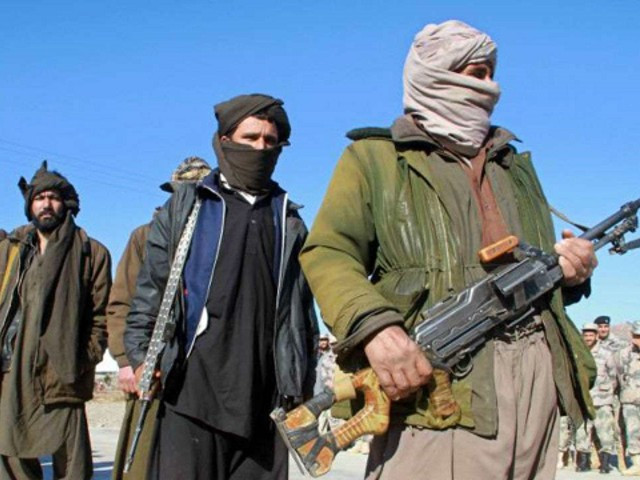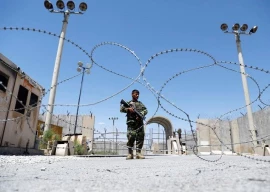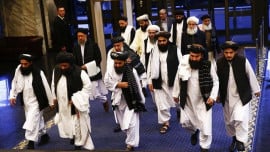
The Taliban’s political office said on Thursday that the group did not seek to seize power in Afghanistan militarily, Russia’s TASS news agency reported.
There has been a rapid deterioration in security in Afghanistan as the Taliban have made gains while the United States withdraws its forces after 20 years.
The group’s political office also said that the insurgent group would not attack the Afghan-Tajik border.
A delegation of the Afghan Taliban’s political office was in Moscow on Thursday, Russia’s Interfax news agency cited a source as saying. The report gave no further details.
Afghan government forces on Thursday wrested back control of a western provincial capital stormed by the Taliban a day earlier and hundreds of fresh troops have been deployed to the region, the defence ministry said.
It said some fighting was continuing on the fringes of Qala-e-Naw, capital of Badghis province, which borders the central Asian country of Turkmenistan.
Moreover, Afghan government forces wrested back control of a western provincial capital stormed by the Taliban a day earlier and hundreds of fresh troops have been deployed to the region, the defence ministry said.
Read Afghan forces retake provincial capital after Taliban incursion
It said some fighting was continuing on the fringes of Qala-e-Naw, capital of Badghis province, which borders the central Asian country of Turkmenistan. Insurgents had on Wednesday seized key government buildings in the city including police headquarters as part of a dramatic Taliban advance unfolding as foreign forces withdraw from Afghanistan after a 20-year-long intervention.
“The city is fully (back) under our control and we are conducting operations against the Taliban on the outskirts of the city,” Defence Ministry spokesman Fawad Aman said.
The ministry said 69 Taliban fighters had been killed in fresh operations on the edge of Qala-e-Naw - the first major provincial capital entered by the Islamist insurgents in their latest offensive.
A large quantity of Taliban arms and ammunition was also seized by government forces, the ministry said on Twitter. The rest of Badghis province is in Taliban hands.
Western security officials say the Taliban have captured more than 100 districts in Afghanistan; the Taliban say they hold over 200 districts in 34 provinces comprising over half the country.
Local officials said some security officers had surrendered to the Taliban, and the insurgents opened the gates of the city jail, freeing hundreds of prisoners.
Most had since been recaptured, officials said.
Overnight, the defence ministry rushed hundreds of commandos to the city to launch a “large scale operation”, spokesman Fawad Aman said on Twitter.
The attack on Qala-i-Naw comes as the Taliban carry out a blistering campaign across the country but mostly in the north, capturing dozens of districts since early May.
The fighting appeared to be spreading in Herat, where officials acknowledged losing two districts to the insurgents.
Read more Taliban looted, torched Afghan homes after evicting residents -Human Rights Watch
Rights group Human Rights Watch said the insurgents were forcing people from their houses in northern areas that they had captured.
“The Taliban’s retaliatory attacks against civilians deemed to have supported the government are an ominous warning about the risk of future atrocities,” said HRW associate director Patricia Gossman.
‘War no solution in Afghanistan’
Top-ranking Taliban officials and a group of mainstream Afghan politicians, who participated in Iran-brokered talks in Tehran, agreed that there is no alternative to peace.
In a joint declaration issued after two days of intra-Afghan talks facilitated by Iran’s Foreign Ministry, the two Afghan sides recognised the “dangers of continuing the war” and its impact on the “health of the nation,” Taliban spokesman Mohammad Naeem said in a series of tweets.
The two opposing sides agreed that war is “not the solution to the Afghan problem” and all efforts must be coordinated for a “political and peaceful solution.”
They also agreed to continue discussions on issues that need “further consultation and clarity,” such as establishing a mechanism for transition from war to permanent peace, the Islamic system of governance and how to achieve it, in their next meeting.

1725877703-0/Tribune-Pic-(5)1725877703-0-165x106.webp)

















COMMENTS
Comments are moderated and generally will be posted if they are on-topic and not abusive.
For more information, please see our Comments FAQ